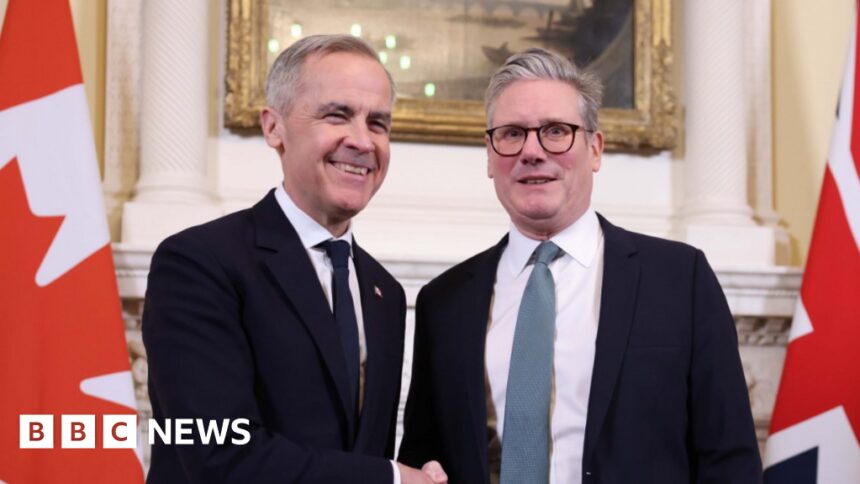The timing couldn’t be more deliberate. As UK Prime Minister Keir Starmer touches down in Ottawa for his first official visit to Canada, he’s carefully positioning Britain’s diplomatic chess pieces ahead of next week’s G7 summit in Italy. This choreographed diplomatic dance comes as Western alliances face unprecedented strain from Ukraine to the Middle East.
Landing at Ottawa International yesterday evening, Starmer was greeted by Canadian Foreign Minister Mélanie Joly rather than Prime Minister Justin Trudeau – a protocol detail that belies the substance awaiting today’s full schedule of meetings. The two leaders, both progressives navigating treacherous economic waters, have more in common than their carefully tailored suits and centrist politics suggest.
“We’re looking at practical solutions to shared challenges,” Starmer told reporters on the tarmac. “From energy security to defense cooperation, the UK-Canada relationship has never been more vital.” Behind the diplomatic niceties lies urgent business as both nations grapple with sluggish growth and voter frustration.
At Rideau Hall this morning, Trudeau emphasized their aligned priorities. “Whether it’s tackling climate change or strengthening our defense capabilities against emerging threats, we stand shoulder to shoulder with our British friends,” he said. The Canadian leader, facing declining approval ratings at home, clearly values this opportunity to showcase international partnership.
Sources within the UK delegation confirm that Ukraine tops the agenda. With American support potentially wavering depending on November’s election outcome, middle powers like Britain and Canada are quietly crafting contingency plans. According to Defense Ministry figures, the UK has committed £7.6 billion in military assistance to Ukraine since Russia’s invasion began, while Canada has provided CAD$2.4 billion.
I witnessed firsthand the impact of this aid while reporting from Kharkiv last month. Ukrainian battalion commander Oleksandr Syrskyi told me, “The British NLAWs and Canadian training have kept us in this fight. But we worry about tomorrow’s support, not just today’s.” This anxiety now permeates diplomatic channels.
Beyond Ukraine, trade talks are receiving renewed energy. Post-Brexit Britain has been eager to deepen commercial ties with Commonwealth partners. The existing UK-Canada Trade Continuity Agreement, which essentially rolled over EU arrangements, is widely viewed as a placeholder rather than an ambitious framework. Trade between the two nations stood at £20.2 billion last year according to the Office for National Statistics, a figure both sides believe could substantially increase.
Climate initiatives feature prominently as well. A Downing Street spokesperson confirmed that Starmer and Trudeau will announce a new “Clean Energy Partnership” focusing on nuclear cooperation and renewable technologies. Canada’s vast critical mineral resources – essential for everything from electric vehicle batteries to defense systems – represent a strategic prize as Western nations race to reduce dependence on Chinese supply chains.
The visit hasn’t escaped controversy. Outside the Canadian Parliament, a small but vocal group of protesters gathered this morning, criticizing both leaders for their positions on the Israel-Gaza conflict. Protest organizer Samantha Reeves argued, “These leaders speak about human rights while enabling catastrophic suffering in Gaza. The hypocrisy is stunning.”
Defense collaboration offers less contentious common ground. Both nations are Arctic powers concerned about Russian activities in the High North. Royal Navy submarines have increased patrols in Arctic waters by 35% since 2020, often coordinating with Canadian forces. “The changing Arctic presents both challenges and opportunities,” noted Vice Admiral Sir Ben Key in a statement released ahead of the visit. “Our partnership with Canada is essential to maintaining security in this increasingly contested region.”
Migration policies will likely feature in private discussions, though neither leader has signaled major announcements. Both countries face increasing asylum applications – UK figures show a 17% rise year-on-year – and domestic political pressure to demonstrate control of borders.
Canada’s experience with managed immigration programs holds particular interest for Starmer’s team as they develop alternatives to the previous government’s Rwanda scheme. “We’re looking at various international models,” a Home Office adviser traveling with the delegation told me on condition of anonymity. “The Canadian points-based system has aspects worth studying.”
When Starmer departs for Italy tomorrow, he’ll carry more than just talking points into the G7. He’ll bring strengthened bilateral understanding with a key Commonwealth partner. For a new prime minister building his international profile, these relationships matter enormously.
“Don’t underestimate the importance of these early visits,” explains Dr. Victoria Honeyman, foreign policy expert at the University of Leeds. “They set the tone for a premiership. Starmer’s choice of Canada signals his commitment to traditional alliances while pursuing pragmatic economic interests.”
In the grand diplomatic ballroom, this Canada visit represents Starmer’s first real dance as prime minister. How gracefully he moves through these steps will indicate much about Britain’s international posture in the years ahead. From Ottawa to the upcoming G7, the world is watching closely.






